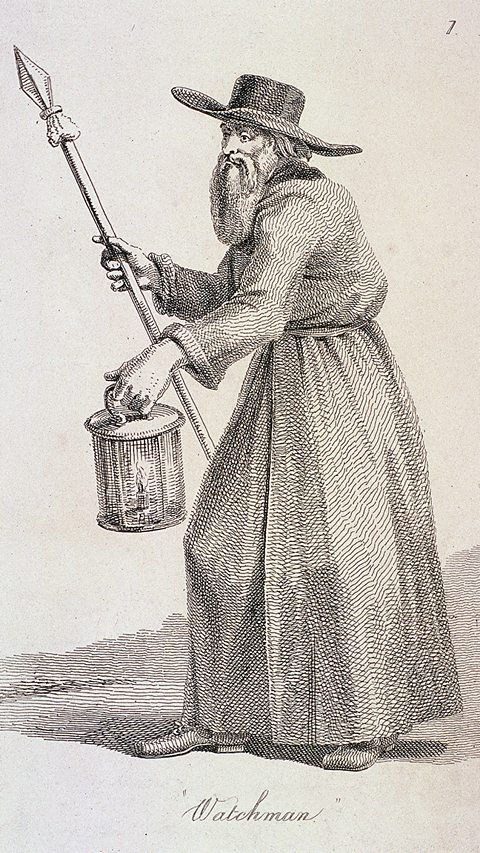Enforcing law and order in the 16th and 17th centuries
Dealing with crime within a local community had been simple in the medieval era, as crime was less common than it became in the 16th century. Communities had been so small, by modern comparisons, that everyone knew everything about each other.
However, by the 16th century, population growth, increased unemployment and more mobility meant that the older means of enforcing laws were becoming less effective.
The growth of civic and parish responsibilities
By 1500 most of the population still lived in rural communities or small towns. However, the feudal systemA term used by historians to describe the hierarchical organisation of medieval society into different groups based on people's roles. The king was at the top of the system with the most power and peasants were at the bottom. was in decline and parishes, rather than the lord of the manor, were increasingly used as a way to organise and control local matters.
Although parishes were religious organisations, throughout the 16th century, Tudor governments gave them increasing powers in local matters. For example, in 1555, parishes were made responsible for the upkeep of nearby roads. In 1601, the Act for the Relief of the Poor - known as the Poor Law - outlined the responsibility of each parish to look after its own poor. Also under the act, parishioners were appointed by Justice of the Peace Someone responsible for maintaining law and order in a county. Often abbreviated to JP. (JPs) to serve as overseers of the Poor Law for one year.
Justices of the Peace (JPs)
The JP had responsibility for law and order in their county. The post of JP started in medieval times, but it became more important in Tudor times. JPs were unpaid and did the role mainly for prestige. They were usually landowners from the county who were appointed annually to the role. However, many did the job for years.
The role included a lot of things that our local councils do nowadays, such as organising road and bridge repairs, checking the accuracy of weights and measures in shops, licensing ale houses, and supervising poor relief.
Petty and quarter sessions
There were around 20 JPs per county. The JPs were also known as magistrateA judge who hears cases in court. They would hold petty sessionsA local court where two or more JPs would deal with minor cases. to deal with minor crimes, such as petty theft and fighting. For more serious cases, such as murder, assault or rioting, a larger number of JPs would meet four times per year at quarter sessions Courts held every three months when a group of JPs would hear serious cases. The most serious cases, such as murder, witchcraft and rioting, would be passed on to the assize courts, where a judge and jury would pass judgement.
The JPs led and organised the parish constables and the town watchmen parish constables.
Watchmen

Watchmen, or bellmen, had existed since the reign of Edward I. They were not paid in medieval times, and all men in a town were expected to volunteer for this duty. They patrolled the streets of the largest towns on a nightly basis. Wealthier town dwellers would pay others to do their duty.
They became known as Charlies, or Charleys, after 1663, when Charles II set up a force of paid watchmen to patrol the streets. They did not have a uniform but were identifiable by their heavy coat, lantern and bell. They were paid out of local taxes.
The Charlies were low paid and were often mocked. However, the intervention of the monarch in policing and the payment of the watchmen marked a significant change away from communities policing themselves.
Parish constables
Responsibility for the day-to-day maintenance of law and order still lay with local communities through the parish constable. The parish, or ÔÇśpettyÔÇÖ, constable was appointed by the JP for a year. The post was unpaid and done in addition to the personÔÇÖs usual day job. They were usually local tradesmen or farmers, which meant that communities were policing themselves.
The parish constable was expected to perform all of the main duties associated with local policing:
- keeping order in inns and ale houses
- keeping the peace in the parish
- sending illegitimate children back to their original parish
- capturing stray farm animals
- arresting people who had committed crimes
- preventing crimes such as trespassing and poachingIllegal hunting or fishing.
- carrying out punishments, such as whipping vagrant91╚╚▒Čless, unemployed person who wandered the streets.
- watching the behaviour of apprentices
- looking out for vagrants
Local people were duty bound to help the constable if he requested it. This kept the community responsible for enforcing law and order.